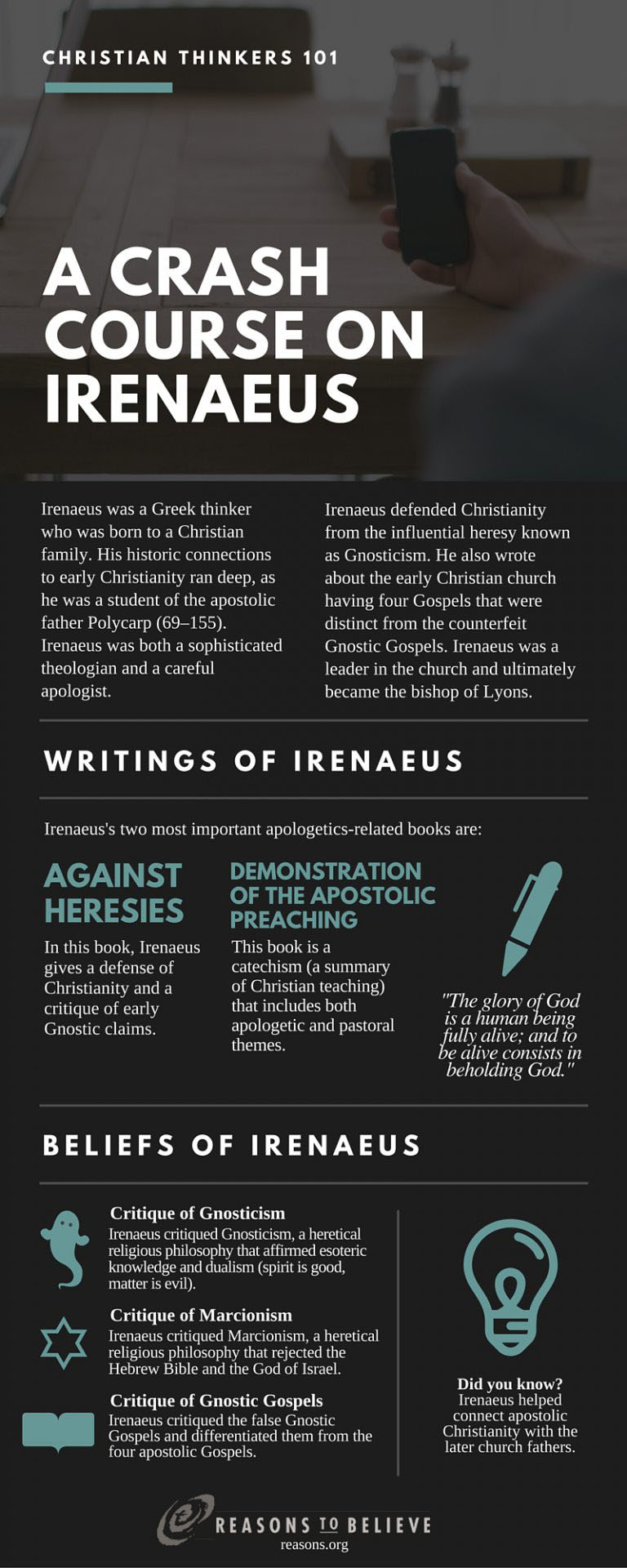Christian Thinkers 101: A Crash Course on Irenaeus
Irenaeus was one of the first Christians to defend the faith against Gnosticism, but what exactly did he believe and what else did he contribute to Christianity? Here’s your crash course on the life and accomplishments of Irenaeus—and why he still matters today.
Who Was Irenaeus?
Irenaeus (c. 130–202) was a Greek thinker who was born in Asia Minor to a Christian family. His historic connections to early Christianity ran deep, as he was a student of the apostolic father Polycarp (69–155). Christian tradition asserts that Polycarp actually knew the apostle John—so Irenaeus wasn’t too far removed from the time of the apostles. Irenaeus was both a sophisticated theologian and a careful apologist. In fact, he was the first Christian apologist to defend Christianity from specific heresies (false teachings that deny essential Christian doctrines). Irenaeus defended Christianity from the influential heresy known as Gnosticism. He also wrote about the early Christian church having four Gospels that were distinct from the counterfeit Gnostic Gospels. Irenaeus was also a leader in the church and ultimately became the bishop of Lyons. There is a late tradition that Irenaeus was martyred, but this claim is not well supported by historical evidence and is rejected by modern scholars.
What Did Irenaeus Write?
Irenaeus’ two most important books are Against Heresies and Demonstration of the Apostolic Preaching. The first book is a defense of Christianity and a critique of early Gnostic claims. The second is a catechism (a summary of Christian teaching) that includes both apologetic and pastoral themes since Irenaeus was also a spiritual shepherd in the early Christian church.
What Did Irenaeus Believe?
Christians of various traditions continue to uphold beliefs articulated by Irenaeus. Perhaps Irenaeus’ three most important Christian apologetics accomplishments are the following:
- Irenaeus critiqued Gnosticism, a heretical religious philosophy that affirmed esoteric knowledge, dualism (spirit is good, matter is evil), and a transcendent non-creator God above Jehovah.
- Irenaeus critiqued Marcionism, a heretical religious philosophy that affirmed Jesus as the savior and Paul as his chief apostle, but rejected the Hebrew Bible and the God of Israel.
- Irenaeus critiqued the false Gnostic Gospels and differentiated them from the four apostolic Gospels.
Why Does Irenaeus Matter Today?
Irenaeus is sometimes criticized for his atonement theory known as the recapitulationism (the view that Christ’s atonement reversed the course of humankind from disobedience to obedience), yet he is an important early Christian theologian and apologist. His critiques of the potent heresies of Gnosticism and Marcionism helped protect Christianity from doctrinal corruption. Irenaeus also helped connect apostolic Christianity with the later church fathers. He is significant in his role of affirming the distinctive apostolic orthodoxy. It is said that Irenaeus was known for seeking to carefully understand competing heresies and then attempting to provide Scriptural and historical arguments against them. It would appear that Irenaeus practiced the golden rule of apologetics: Treat other people’s beliefs the way you want yours treated (carefully, fairly, accurately). Irenaeus is important today because he helps connect the doctrinal truths of apostolic Christianity with the faith’s later development. Furthermore, Irenaeus provides important background information about who authored the various biblical books and what their purposes were in being written.
Other articles in the Christian Thinkers 101 series: St. Augustine; C. S. Lewis; Blaise Pascal; St. Anselm; St. Athanasius; St. Thomas Aquinas; Jonathan Edwards; Søren Kierkegaard; St. Bonaventure; Martin Luther; John Calvin
Reflections: Your Turn
Irenaeus defended Christianity from heretical teachings. What can Christian churches do today to help their people avoid false doctrine? Visit Reflections on WordPress to comment with your response.
Resources
- For an examination of Irenaeus’ life and accomplishments, see Getting to Know the Church Fathers: An Evangelical Introduction by Bryan Litfin.








